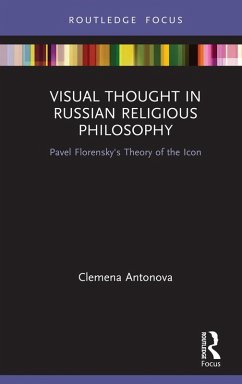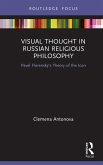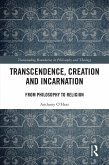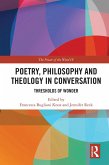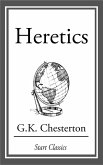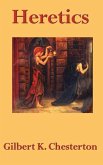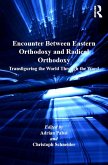Organized around the themes of full unity and visuality, the book examines Florensky's definition of the icon as "energetic symbol," drawing on St. Gregory Palamas, before offering a theological reading of Florensky's theory of the pictorial space of the icon. It then turns to Florensky's idea of space in the icon as Non-Euclidean. Finally, the icon is placed within wider debates provoked by Bolshevik cultural policy, which extend to current discussions concerning religion, modernity, and art.
Offering an important contribution from Russian religious philosophy to issues of contemporary modernity, this book will be of interest to scholars of religious philosophy, Russian studies, theology and the arts, and the medieval icon.
Dieser Download kann aus rechtlichen Gründen nur mit Rechnungsadresse in A, B, BG, CY, CZ, D, DK, EW, E, FIN, F, GR, HR, H, IRL, I, LT, L, LR, M, NL, PL, P, R, S, SLO, SK ausgeliefert werden.
"This book is not just of interest to the relatively small circle of experts in Russian religious philosophy, but deserves a much wider readership. The monograph is well researched, lucid, and very accessible, but without oversimplifying the complexity of the material. Antonova convincingly argues that the intermediation between Christian theology, philosophy, and aesthetics, characteristic of Florensky's writings, was a response to the crisis of modernity and an attempt to evade the erosion of Christian metaphysics. Florensky's daring and creative engagement with Byzantine theology, Cubism, Non-Euclidean geometry, and set theory was motivated by the need for a consistently Christian vision of the world." - Christoph Schneider, Academic Director, Institute for Orthodox Christian Studies, Cambridge, UK
"Florensky's religious philosophy has great relevance for understanding pictorial art. In particular, his theory of the icon comprehends the spectator-image relation in a way that challenges familiar Western notions of pictorial representation. Clemena Antonova's fine book throws much light on these issues, and presents Florensky's ideas in a sparkling way that illuminates their relevance for many other aspects of religious thought in the contemporary world." - Paul Crowther, Professor Emeritus in Philosophy, National University of Ireland, Galway, and member of the Royal Irish Academy
"In this important book, Antonova offers a comprehensive analysis of what one may call the new theology of visuality of Pavel Florensky, which has influenced thinkers in Russia and beyond." - Alexei Lidov, Professor at Moscow State University, Russia, member of the Russian Academy of Arts, and member of St. Catherine's College, Oxford, UK

